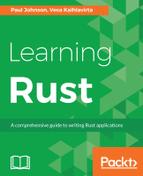String slices can be confusing at first sight. We define a string slice like this:
let homeTeam = "Liverpool";
Coming from more dynamic languages, you might think that we are assigning the string Liverpool to the variable binding homeTeam. That's not exactly what happens, however. The homeTeam binding is actually a string slice: a reference to a part of the string that actually resides somewhere else.
The string slice is also not mutable.
The following will not work in Rust:
let homeTeam = "Liverpool"; let result = " beat "; let awayTeam = "Manchester United"; let theString = homeTeam + result + awayTeam;
The compiler will not allow this, and will give an error as follows:

We cannot concatenate the slice directly, since string slices cannot be mutable. To do that, we need to first convert the string slice into something that is mutable, or build the string with something like the format! macro. Let's try them both.
Like before, the to_owned() method takes the slice the method is attached to, and converts it to a String type:
fn main() {
let homeTeam = "Liverpool";
let result = " beat ";
let awayTeam = "Manchester United";
let fullLine = homeTeam.to_owned() + result + awayTeam;
println!("{}", fullLine);
}
When this is built and executed, you will see the following:

